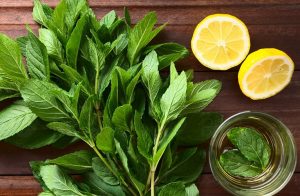 Upset stomach. Ugh. Not horridly painful, nothing serious, just out of sorts and a bit, acidy, you know—really don’t feel like eating. So I’ve been trying to use more herbal remedies for the little aches and pains of life, and I googled herbal remedies for upset stomachs. Came up with mint tea—specifically, peppermint tea. Ah, okay, lots of peppermint growing in the backyard, so let’s give it a try.
Upset stomach. Ugh. Not horridly painful, nothing serious, just out of sorts and a bit, acidy, you know—really don’t feel like eating. So I’ve been trying to use more herbal remedies for the little aches and pains of life, and I googled herbal remedies for upset stomachs. Came up with mint tea—specifically, peppermint tea. Ah, okay, lots of peppermint growing in the backyard, so let’s give it a try.
Making mint tea is simple. Rinse off the mint leaves and stems (any part of the plant will do), put a handful in a Mason jar, and pour in boiling water. And that’s it. Let it steep for a while—like a teabag, how long you let it steep will determine how strong it is. Mmm, fresh, minty smell. It’s pleasant medicine indeed.
Making mint tea is simple. Drinking mint tea is not so simple.
After a few sips I was astounded to find out that my unsettled stomach was markedly worse. Hmm. Maybe I just need to give it time. The stuff tastes wonderful, hot and steamy and minty…but my stomach is decidedly not agreeing. I abandoned the mint tea and my stomach was grateful.
But a few days later, after a big holiday meal with overindulgence in pumpkin pie, I was feeling uncomfortably stuffed. Mint tea was being served, so I tried it again. And it was perfect. Just right. The sharp, minty taste was exactly what I was craving after all that rich food, and magically, the peppermint tea set my overworked stomach to rights.
Back in the old days, before CVS and Rite-Aid, the herb garden was where you went for over the counter remedies. Sage, thyme, mint, lemon balm—they weren’t only, or even primarily, culinary treats—they were Kaopectate and Aleve and Tums and Tylenol. Mint was for upset stomachs, all right, but specifically for some types of upset stomachs and not others.
And the herb-wives or grandmothers who administered mint to their families and neighbors knew how mint works—not the chemistry behind why it works, but the symptoms that it would alleviate. And perhaps even more importantly, they also knew their patients. The person being treated was probably their own kid, or grandkid, or a spouse, or a neighbor. So the herbalist would know that this person has a nervous stomach (no mint tea, try catnip instead) but that person is famous for pigging out and would really benefit from some hot, strong mint tea. Knowing your patient is at least as important as knowing your herbs.
Note: since mint can relax the esophagus, people with GERD should not drink it. Also, mint tea is not recommended in large doses for pregnant women, infants, and young children.





Recent Comments